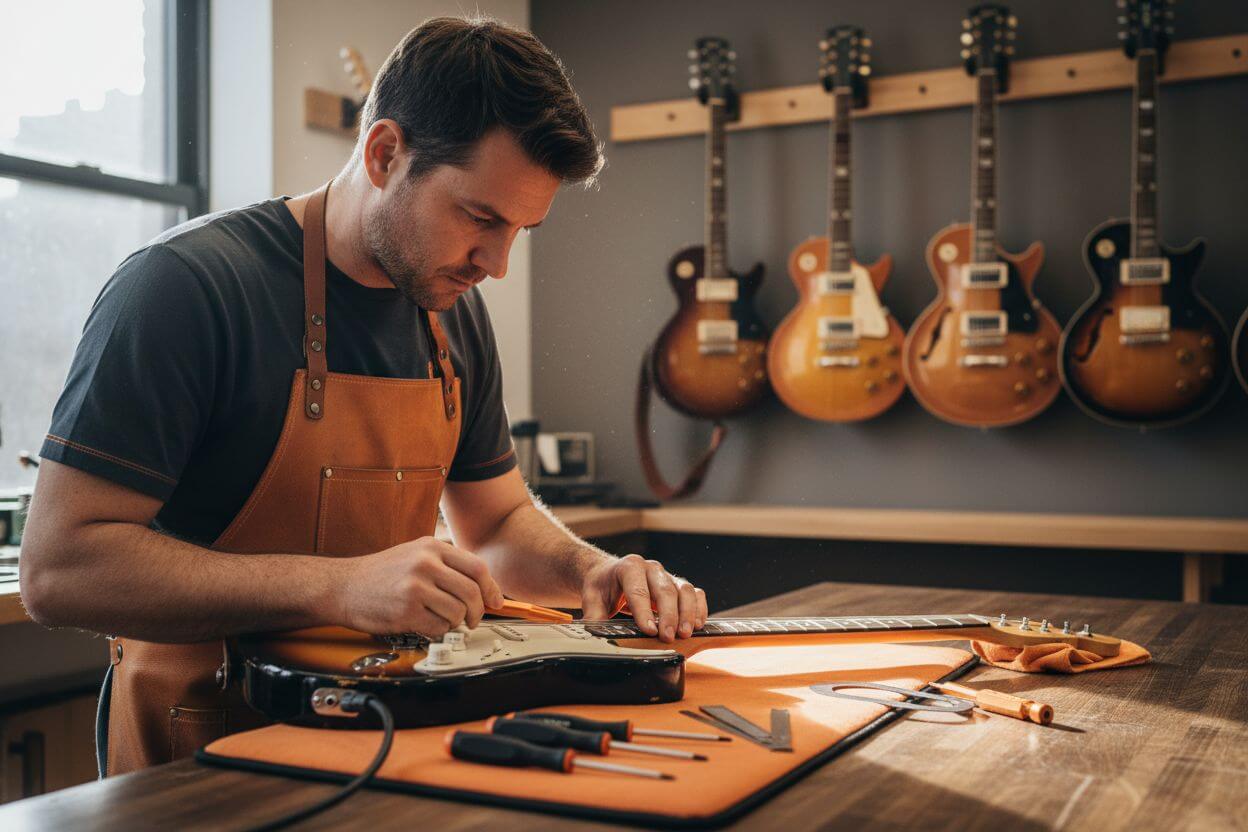At Musicstreet we often get asked by customers '... I need some strings for my guitar...' which then leads to understanding which thickness to go for, what type of guitar are they for and what suits the individual's playing needs.
Here's some aspects to consider when purchasing strings in general:-
- 'Feel' - often an overlooked area - do you play with a soft attack on the strings with your strumming hand? Is vibrato and bending a big part of your playing style? These physical techniques could be hindered potentially if the strings on the guitar are too light a gauge (set size) or too heavy. To a degree it is a bit of an experiment to begin with to find what works for you and your individual playing preference. An example of this would be the Young brothers of AC/DC fame -Angus sides with using fairly light strings (9-42) whilst his brother, Malcolm, used much heavier (12-58)!!
- 'Physical Approach' - as mentioned, heavier strings may work in theory - bigger is better, right?! But, the draw back could be that with various playing techniques - vibrato, bending etc. you may find that after a short period of playing that cramp and general fatigue may kick in. At this point it would certainly give a good indication to move to a lighter string set.
- Setup - the slight downside to trying different string gauge sets is that ideally you would need to get the guitar setup each time. However, I would say that as long as you don't jump too drastically between set sizes (eg. from 9-42 to 11-48) then you can probably get away with things initially when swapping. Once you feel that you're heading in the right direction then it may be worth having the guitar looked over just in case - this would especially be the case should your guitar have a tremolo system is it will have likely moved.
- Tuning & Scale Length - standard tuning is what is commonly referred to as 'E standard'. This is what most guitars will come setup with when new and the common size set for this tuning is 9-42 for electrics and 12-53 for acoustic guitars. Bass guitars are typically fitted with 45-105. Should you need to be creative in a different tuning, most likely lower than 'E standard, then there is potential for the strings to feel a little sloppy. In this instance you would want to go for a heavier set to compensate. Scale length - (the measurement taken from the top nut to the bridge) can influence your string choice also - the longer the scale the more taught the strings will likely feel.
- Type of Bridge - the type of bridge (especially on electric guitars) can really affect the tone and feel - whether it be 'Fixed', 'Wrap around', 'Tremolo' etc. they all have their own character signature that contributes to how the guitar responds to your playing style and overall tone from the instrument. String size at this point tends to have a potential physical/mechanical aspect with regard to fitting and how, for example, a tremolo bridge would need to be adjusted - string tension versus spring tension. Typically, I have found that a fixed/wrap around style bridge has an immediacy and fast attack on the notes where as a tremolo guitar is a little more forgiving.
- String Size - is bigger better, and does it matter! - okay, so to finish off perhaps it's worth remembering that there is no real right or wrong, just what works for you and your playing style/approach. An 11-48 gauge set will likely sound bolder but will be tougher to work with, where as 9-42 will have more presence and will feel like your playing is not impeded. As long as your hand strength is supporting your playing technique then perhaps try something new with a different string size. Is 'bigger better'... well, not necessarily. Plenty of players have pushed the extremes of string size in both directions (Billy F. Gibbons uses 7 gauge sets meanwhile Stevie Ray Vaughan played 12 gauge sets for the most part and both have amazing guitar tone!) but the idea that lighter strings are not as toneful as heavier strings is not the case. It's all down to the physical approach and touch that the individual player has to playing guitar.
Until the next time, all the best
Sammy
OUR MOST POPULAR SEARCHES :
Guitar Strap | Yamaha Revstar | PRS Custom 24 | PRS Guitars | Les Paul Guitars | Guitar Amp | Martin Guitars | Fender Acoustic Guitar | Electric Guitar For Beginners | Guitar Accessories | Electric Guitar | Bass Guitar | Acoustic Guitar | Guitar Strings | PRS Silver Sky | PRS McCarty 594 | Maton Guitars | PRS Tremonti | Patrick James Eggle Guitars | PRS Hollowbody ii Piezo





Share:
What Does SE Stand For On PRS Guitars?
Are 'High End' guitars that much better?